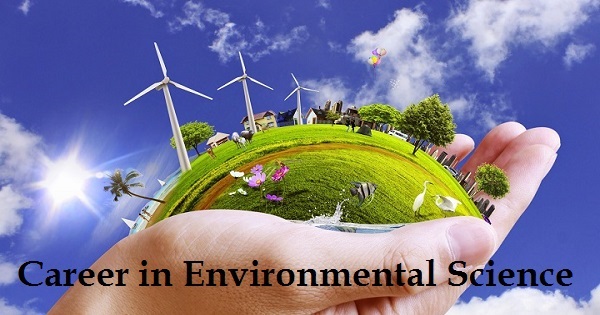

Career In Environmental Science
Naief Khatri

It is the study of environment in a scientific approach of Physical, chemical and Biological context. Environmental science is an advanced study of climatic change, conservation of energy, biodiversity, ground water and soil contamination and the technologies developed to arrest/treat air pollution, sound pollution, and even dazzling head lights of vehicles, Vehicles pollution, Industrial pollution, and plastic menace.
Of late, Environmental science is emerging as one of the most sought after careers as people throughout the world are becoming more and more aware about the significance of clean environment.
Read: Career in Physiotherapy
Environmental Science Eligibility Criteria
Some institutions have begun to offer subjects related to environmental studies at the BSc degree level. But Environmental Science is generally taught as a MSc programme. Environmental scientists require a Master’s degree in Environmental Science or a ME in Environmental and Chemical Engineering. Candidates aspiring to join an NGO generally need a B.Sc. or an M.Sc.
Environmental Science Job Prospects
As Environmental Science is a broad term that incorporates various activities towards protecting the environment, thus offers plenty of employment opportunities for not only environmental scientists, but also for environmental biologists, environmental engineers, environmental modelers and environmental journalists.
Read: Dancing As A Career
Environmental scientists are employed by mines, fertilizer plants, textile and dying industry, food processing units, etc. NGOs are growing in strength in issues related to the environment.
The following are important areas of work which an environmental scientist can take up:
- IndustriaL Sector: Environmental scientists work towards maintaining an ecological balance, biodiversity and wasteland management, and the preservation of natural resources. They are in demand as most industries have a separate environmental research and developmental section.This section looks after the impact which their industry has casted on the environment. Their main assgnment is to look after various ways to control pollution. It also deals with the waste that is thrown out and the various aspects of management and planning.
- Research and Development: With the increase in public awareness regarding the environment, there is tremendous scope for research and development in this field. Various universities and governmental organization offer scope for R&D.They conduct research studies in order to develop theories or methods towards controlling the precious sources to environmental pollution.
- Forest and Wildlife Management: Apart from providing numerous resources, forests contribute towards striking an environmental balance. Therefore managing and maintenance of forest and wildlife is very crucial & hence the need for trained professionals.
- Social Development: Non Governmental Organizations (NGOs) help in creating awareness regarding the protection of the environment and making the masses aware of various environmental issues and generating a public opinion. They also work towards disseminating information and in bringing about changes in political policies effecting the environment.
- Environmentalist: Cleansing of rivers and forest are some of the activities of environmentalist. Afforestation and regeneration of the forest area form one of the important activities of an environmentalist.
- Environmental Journalism: With so much consciousness about the environment among the public, reporting on environmental issues is on the rise. People look for comprehensive news related to the environment, hence the need for trained environmental journalists.
- Consultants: There are independent environmental consultants working with the government’s Central and State Pollution Control Board. These consultants offer advice related to the environment. They also direct the concerned industry looking for advice on environmental laws to lawyers specialized in this field.
Environmental Science Pay Package
Remunerations in this field vary depending on the qualification and the area of work. The starting salary at the NGOs can vary between Rs 5,000 to Rs 11,000 per month. In private industries, the starting salaries range from Rs 7,500 to Rs 13,000 per month. In the research field the salary can start at approximately Rs 9,000 to Rs 12,000. Teachers are paid anywhere between Rs 7,000 to Rs 10,000.
Importance of studying Environmental Science
- To learn about the sustainable way of living.
- To use natural resources more effectively without harming the environment
- To educate and aware people about environmental problem & issues
- To learn the importance of environment and how to conserve it.
Environmental Science Institutes/Universities
- Indian Institute of Sciences
Bangalore 560012
Phone: +91 (80) 2293 2315.
Course : MSc Course in Environmental Sciences
- Wild life Institute of India
18, Chandrabani
Dehradun-248001, Uttaranchal
Phone: +91-135-2640111 to2640115, 2641433, 2640990
Course : MSc Course in Environmental Sciences
- Bombay Natural History Society
Address: Hornbill House
Shaheed Bhagat Singh Road
Mumbai, 400 023
Course : MSc Course in Environmental Sciences
Hamdard Nagar, Tughlakbad
New Delhi – 110 062
Phone: 091-11-2605 9688, Ext. 5530; 5539
Fax: 2605 9663
Course : MSc Course in Environmental Sciences
- Government Engineering College
Ujjain – 456010
Madhya Pradesh
Course : M.E. in Civil Engineering (Environmental Engg / Pollution Control)
- Maulana Azad College of Technology
Bhopal – 462007
Madhya Pradesh
Course : Environmental Engineering & Planning (Public Health Engineering)
- Indian Agricultural Research Institute
New Delhi – 110012
Course : M.Sc. in Environmental Sciences
- School of Planning and Architecture
4, Block-B
Indraprastha Estate
New Delhi
Course : Ph.D. in Environmental Planning
New Delhi 110067
Course : M.Sc, M.Phil & Ph.D. in Environmental Sciences.
- Centre for Pollution Control & Biowaste Energy
Pondicherry University
Pondicherry
Course : Ph.D. degree in Environmental Engineering, Ecotourism
- The Adventurers Wilderness School
142, 69th Cross
5th Block
Rajaji Nagar
Bangalore- 560010
Course : Ecotourism
Environmental Engineering
- College of Engineering
Guindy
Chennai – 600025
- Shri G S Institute of Technology & Science
23, Park Road
Indore – 452003
- P E S College of Engineering
Mandya – 571401
Kamataka
Latest News
People Reading Now

CBSE Compartment Result 2023 OUT: Click For Direct Link



CSAB 2023: Special Round Registration Begins Today


